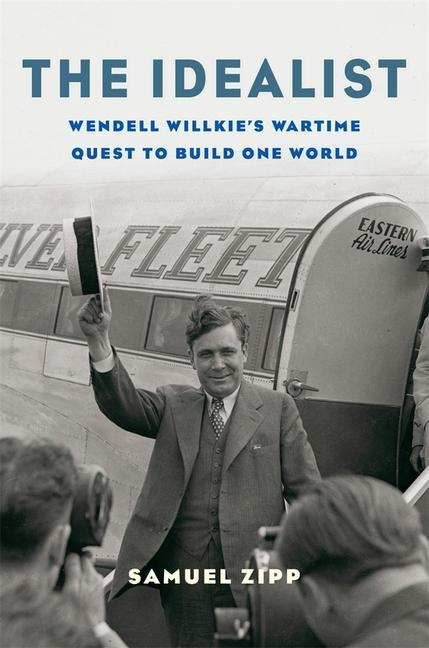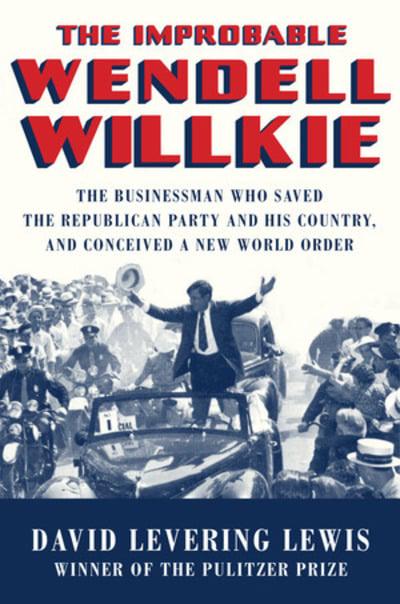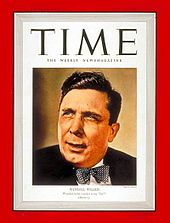The Idealist: Wendell Wilkie’s Wartime Quest to Build One World (2020) by Samuel Zipp
GoodReads meta-data is 416 pages rated 4.0 by two litizens.

and
The Improbable Wendell Wilkie (2018) by David Lewis
GoodReads meta-data is 400 pages, rated 3.73 by 86 litizens.
Genre: Biography.

Verdict: Meh. Meh.
I am in the market for a biography of Wendell Wilkie but neither of these two samples captured my attention. The Zipp sample is quite long but the book is not a biography and otherwise not compelling. The Lewis sample is chapter one only and it did not suffice to lure me in for the whole works. In neither case is my judgement a reflection on the subject who remains of interest.
Lewis Wendell Wilkie was born in Indiana and proud of it. He never held a public office and ran for an elected office only once – the President as the Republican Party nominee in 1940, against the twice incumbent FDR.
He went by the name Wendell because when he joined the Army in 1917 a clerk mistakenly transposed his first names, and by the time Wilkie realised this had happened it was in all of the army records, so he decided to accept it. On the point of names it is a curiosity to note that he married Edith Wilk.
Wilkie grew up in a small town that experienced the ups and downs of the business cycle. That experience of boom and bust made him accept, if not advocate, government regulation. Elwood, Indiana prospered with electricity and in time he became a business man investing in and selling electricity in the area. At the time, as with the railroads, there were many competing electricity providers with different standards and little capital for investment in research and development or improvement of service. He began buying these up in a holding company that at one time was one the largest businesses in the land. He re-located to New York CIty.
His parents instilled in him a respect for and appreciation of art and literature and he waxed in New York City with its libraries and galleries. He became a patron of the arts, but he never did quite fit in. He seldom wore the de rigour tuxedo on glittering occasions; he introduced himself to drivers, waiters, and other workers. He did not regard the Roosevelt administration as socialist as did so many eastern industrialists. He encouraged the development of trade unions in his electricity empire and worked with them to improve safety. From New York City his outlook broadened to international affairs. In short, he became a Ripon Republican true to the original purposes of the GOP.
He differed strongly with FDR about the Tennessee Valley Authority and became a national figure as a result. He led the business and industry opposition to this vast project, testifying before Congress, on a speaking tour, lining up lobbyists, overseeing the advertising campaign, and in so doing discovered that he liked the limelight, that he liked meeting people, that he liked travelling (and seeing the country), that he had the stamina and wit to do it.
Robert Taft and Thomas Dewey were silently locked in a death struggle for the 1940 Republican nomination when Wilkie took it by storm. He did not participate in the few primary election there were, nor did he court the GOP establishment in state committees. He did it by an energetic public campaign of speaking, meeting, listening, debating, and being here, there, and everywhere. He got the nomination on the fifth ballot when it was clear that neither Taft nor Dewey would ever get a majority so much did they and their supporters detest each other. It all seemed spontaneous and neither of these samples say anything about the organisation that made it happen, but surely there was one.
While he polled better than the 1936 Republican candidate (Alf Landon) he lost. He alienated much of the Republican base during the campaign with his explicit support of trade unions, international relations, civil rights, and more. A journalist today looking for a cheap shot (when do they not?) would say he was FDR-lite, His differences with Roosevelt were matters of degree, not of kind.
He had been a registered Democrat and said in many interviews that Woodrow Wilson was right about the League of Nations. That conviction meant the Republican Senate which had blocked adhesion to the League was wrong, and that riled the hard core of the GOP. Some of those very same Republican Senators were still in the Senate. He changed his registration to Republican six weeks before the nominating convention but he never changed his mind about Wilson.
In January 1941 after the election, President Roosevelt asked him to go on a good will tour around the world, bearing personal messages from FDR to Churchill, Stalin, and Chang-Kai Shek in a display of national unity. Wilkie took the assignment and set out on a remarkable voyage that made him even more of the internationalist than before. Neither of these samples gets to this trip.
The relationship between Democrat Roosevelt and Republican Wilkie seems to parallel that of Democrat Wilson and Republican Hoover. Respectful and civil with a fundamental unity of purpose for the common good which proved more important than momentary partisan advantage.

